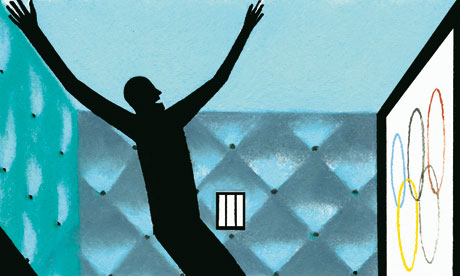
Cast your mind back, and you might remember the 2012 Olympics. This was a time when it was commonplace for British people to hold cheery conversations with strangers, or even to entertain the thought that life, all things considered, was pretty good. That's all in the past now. (Though I've a horrible feeling the tenuously Olympics-themed self-help books – Race Ahead In Business The Mo Farah Way, etc – are still to come.) In a few years, this spurt of happiness may be recalled as nothing but a strange delirium, a collective episode of mental illness. But what if that's exactly what happiness is?
This year marks the 20th birthday of a medical paper making this argument, and it's worth dusting off, not least as an antidote to post-Olympics blues. Entitled A Proposal To Classify Happiness As A Psychiatric Disorder, it was published in the Journal Of Medical Ethics. Some have suggested its author, the psychology professor Richard Bentall, was engaging in deadpan humour, but he builds a persuasive case. Consider how psychiatrists usually define a "disorder". It must be statistically abnormal; Bentall cites evidence that, depending on your definition, happiness is. It must involve "clusters of symptoms that occur together", which happiness does. It's often argued that a true disorder must interfere with the patient's efforts to achieve their life goals. Well, overindulgence in food and alcohol is strongly associated with happiness, yet threatens people's lives. Happiness triggers impulsive behaviour. Then there's "depressive realism", the (controversial) claim that depressed people have a more accurate grasp of their abilities than others. True, Bentall concedes, happiness is generally seen as positive. But that's a value judgment, and these have no place in science: if an alcoholic enjoys her alcoholism, or a manic person his mania, do their disorders magically vanish? No. So we need a new classification. Bentall proposes some suitable jargon: "Major affective disorder, pleasant type."
Bentall's purpose (and, yes, he was joking) was to highlight the troublesome nature of psychiatric diagnosis – the way conditions such as schizophrenia are constructed from subjective judgments, though psychiatrists then treat them, usually with drugs, as if they were objective and clear-cut. But there's another lesson: the possibility that happiness as most of us conceive it – a long-term state of unbroken uplift – really isn't normal. In the years since Bentall's proposal, the science of happiness, aka positive psychology, has exploded. Why, its advocates argue, should psychology focus only on things going wrong? Fair enough. But the unspoken implication is that happiness is the default, near-universal state – what people without mental illnesses usually feel. Which makes unhappiness doubly problematic. You're not merely gloomy, the insinuation goes: you're abnormal in your gloom. You're not just lonely (or anxious, or angry), but weird for feeling that way, too.
None of this means happiness isn't preferable to sadness. But to paraphrase Steven Hayes, the pioneer of "acceptance and commitment therapy", it's unhelpful to imagine it's the norm. So is it curmudgeonly to suggest that we drop this talk of bottling the Olympics feelgood factor? If you want to feel good, look at it this way: you had a psychiatric disorder. It's over now. Isn't it wonderful to feel healthy again?
• oliver.burkeman@theguardian.com
Follow Oliver on Twitter
• The headline on this article was amended on 26 August 2012. The original headline misspelled the words "Olympic" and "delirium".

